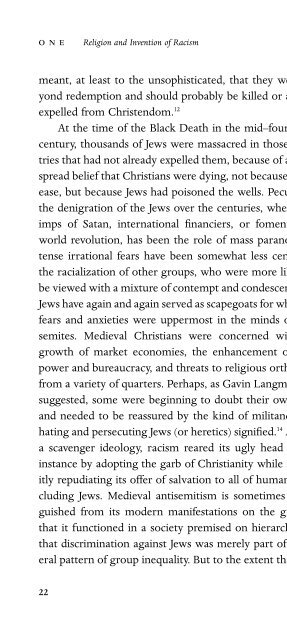Racism - A Short History - George M Fredrickson.pdf - WNLibrary
Racism - A Short History - George M Fredrickson.pdf - WNLibrary
Racism - A Short History - George M Fredrickson.pdf - WNLibrary
Create successful ePaper yourself
Turn your PDF publications into a flip-book with our unique Google optimized e-Paper software.
TWO The Rise of Modern <strong>Racism</strong>(s)<br />
cans had of course made Europeans aware of their own<br />
light pigmentation, but in other contexts whiteness, as opposed<br />
to national and religious affiliations, was not a conscious<br />
identity or seen as a source of specific inherited traits.<br />
At a time when social inequality based on birth was the<br />
general rule among Europeans themselves, color-coded<br />
racism had little scope for autonomous development. In<br />
the New World, where European pigmentation could be<br />
readily compared to that of black slaves or copper-toned<br />
Indians, color soon became one—but only one—of several<br />
salient identities. In the North American colonies, according<br />
to Winthrop Jordan, “the terms Christian, free, English,<br />
and white were for many years employed indiscriminately<br />
as metonyms.” 3<br />
By the early seventeenth century you had to be black<br />
to be a slave in the American colonies, but it was legal<br />
and religious status rather than physical type that actually<br />
determined who was in bondage and who was not. In every<br />
New World slave society, some proportion of the population<br />
of African descent was acknowledged to be free or<br />
semifree. In early- to mid-seventeenth-century Virginia, for<br />
example, blacks might be slaves, indentured servants, or<br />
freemen, depending on the circumstances of their arrival in<br />
the colony and, in some cases, on whether or not they were<br />
Christians. Blacks frequently sued for their freedom on the<br />
grounds that they had been wrongly enslaved. 4 Slaves on<br />
plantations might be treated as grossly inferior to their masters,<br />
but white indentured servants were not treated much<br />
differently, at least on a day-to-day basis. When they bargained<br />
for cargoes on the Guinea Coast of Africa, Europeans<br />
were forced to treat the indigenous rulers or entrepre-<br />
54
















